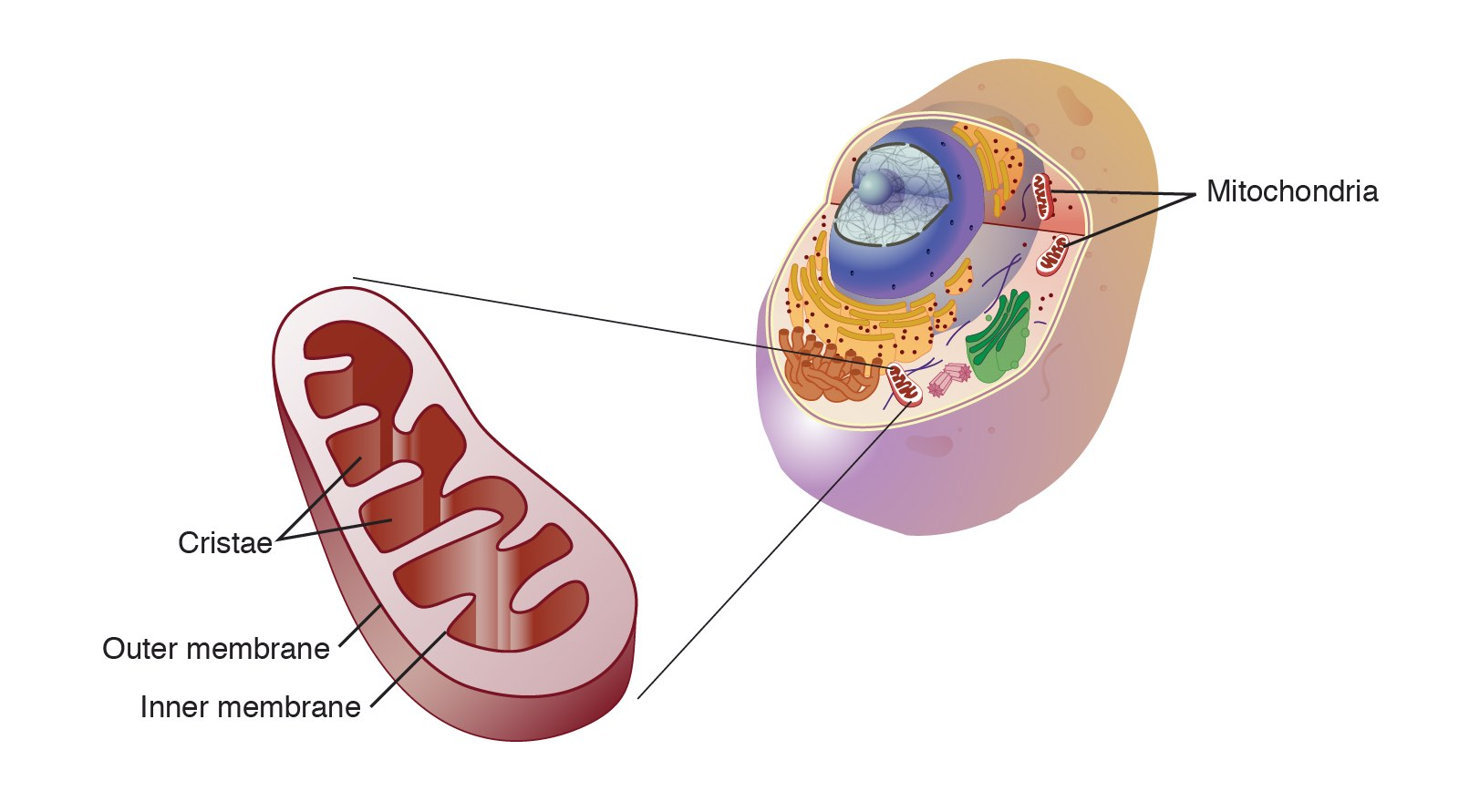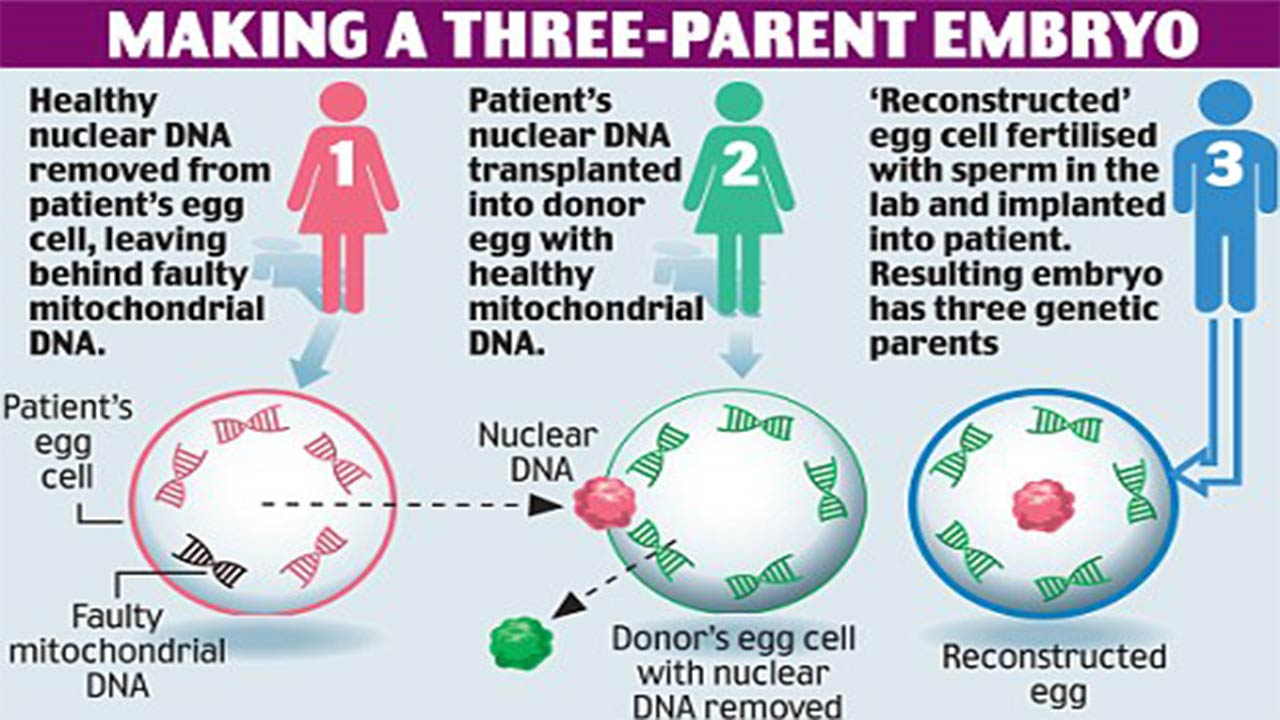Important Facts For Prelims
Mitochondrial Replacement Therapy
- 15 May 2023
- 5 min read
Why in News?
The recent news of a baby born in the UK with three parents' DNA has sparked curiosity and discussions about the scientific breakthrough behind this remarkable achievement.
- This revolutionary technique, known as mitochondrial replacement therapy (MRT) or three-parent IVF, aims to prevent the inheritance of mitochondrial diseases.
What is Mitochondria?
- About:
- Mitochondria are membrane-bound organelles found in the cells of most eukaryotic organisms.
- They are often referred to as the "powerhouses" of cells because they generate the majority of the cell's energy in the form of adenosine triphosphate (ATP).
- Functions:
- Mitochondria carry out cellular respiration, a process that converts nutrients into ATP.
- Mitochondria convert energy from carbohydrates, fats, and proteins into a usable form for the cell.
- They metabolize glucose to produce ATP, which powers various cellular processes.
- Mitochondria participate in cell signaling pathways, influencing processes like cell growth, differentiation, and apoptosis.
- Inheritance:
- Mitochondria have their own DNA, known as mitochondrial DNA (mtDNA), which encodes a small number of essential proteins.
- In most animals, mtDNA is inherited solely from the mother.
- Mutations in mtDNA can lead to mitochondrial disorders and various health conditions.
- Mitochondrial Diseases:
- Certain mutations in mitochondria can lead to mitochondrial diseases, affecting energy production and impacting various organs, including the brain, nerves, muscles, kidneys, heart, and liver.
- These diseases can result in severe symptoms, such as organ failure, muscle wastage, and even brain damage. Unfortunately, there is no cure for mitochondrial diseases, but they can be managed to some extent.
- Few examples of mitochondrial diseases are Leigh Syndrome, Kearns-Sayre syndrome (KSS), Mitochondrial Myopathy and Mitochondrial DNA Depletion Syndrome.
What is Mitochondrial Donation Treatment (MDT)/MRT?
- About:
- To address the issue of mitochondrial diseases, scientists and researchers developed an advanced In Vitro Fertilization (IVF) technique called Mitochondrial Donation Treatment (MDT) or three-parent IVF.
- This technique involves a complex process to ensure that the baby inherits healthy mitochondria while carrying the genetic material from both biological parents.
- To address the issue of mitochondrial diseases, scientists and researchers developed an advanced In Vitro Fertilization (IVF) technique called Mitochondrial Donation Treatment (MDT) or three-parent IVF.
- The Scientific Process:
- Identifying Suitable Candidates:
- The procedure is specifically intended for couples who wish to have their genetic child but do not want to use a donor egg.
- Selection of Donor and Biological Parents:
- The biological mother, who has a mitochondrial disease, provides her eggs, which are fertilized by the biological father's sperm.
- Additionally, a separate female donor with healthy mitochondria is involved.
- The biological mother, who has a mitochondrial disease, provides her eggs, which are fertilized by the biological father's sperm.
- Mitochondrial Replacement:
- The genetic material (DNA) from the donor's egg is extracted and replaced with the genetic material from the biological parents.
- This creates an embryo with the parents' DNA and the donor's mitochondria.
- The genetic material (DNA) from the donor's egg is extracted and replaced with the genetic material from the biological parents.
- Implantation and Pregnancy:
- The modified embryo is then implanted in the uterus and carried to full term, resulting in the birth of a baby free from the mother's mitochondrial disease.
- Identifying Suitable Candidates:
- Potential Side Effects:
- While the procedure has shown promising results, it is not without minimal risks. In some cases, a small amount of faulty maternal mitochondria may be inadvertently passed on during the procedure.
- Further research and published data are needed to establish consensus and refine the technique for improved outcomes.
- Legislation and Approval:
- The UK government amended its law in 2015 to allow mitochondrial replacement therapy, and the Newcastle Fertility Centre became the first licensed center to perform the procedure in 2017.
- Mitochondrial Disease Statistics:
- Globally, an estimated 1 in 5,000 people have a genetic mitochondrial disease.
- Mitochondrial disorders affect approximately one in 6,500 babies in the UK, and around 12,000 people in the country live with such conditions.
- In the United States, an estimated 1,000 to 4,000 babies with mitochondrial disease are born each year.
- Globally, an estimated 1 in 5,000 people have a genetic mitochondrial disease.
UPSC Civil Services Examination, Previous Year Questions (PYQs)
Q1. In the context of hereditary diseases, consider the following statements: (2021)
- Passing on mitochondrial diseases from parent to child can be prevented by mitochondria replacement therapy either before or after in vitro fertilization of the egg.
- A child inherits mitochondrial diseases entirely from mother and not from father.
Which of the statements given above is/are correct?
(a) 1 only
(b) 2 only
(c) Both 1 and 2
(d) Neither 1 nor 2
Ans: (c)






